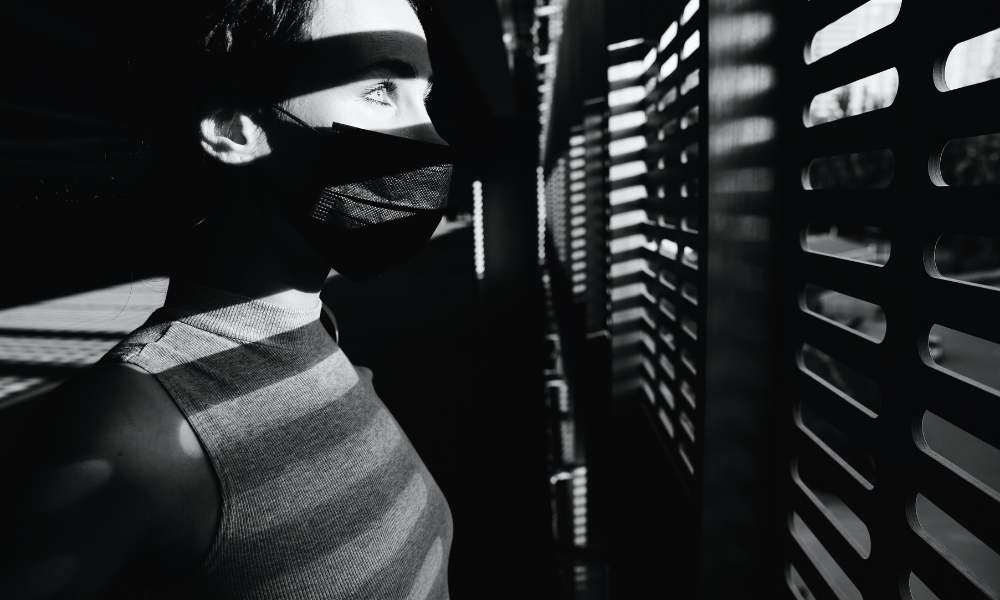Table of contents
What is it to be paranoid?

Being paranoid is associated with seeing and believing in situations that do not correspond to reality, causing the person to be psychologically shaken by believing in surreal things. Thus, ideas that involve danger without a plausible explanation tend to be a concern for paranoid people.
In this sense, people or possibilities are the target of suspicion because of paranoia. It is worth considering that the intensity of the symptoms caused varies according to each individual, and may be mild or severe. However, in all cases such disorder affects the quality of life and causes damage to mental health.
In order to understand the characteristics presented by the carrier, types of paranoia, ways to mitigate the symptoms of the disorder, as well as other information, follow the article.
Meaning of paranoid

In order for you to understand more about paranoia, as well as about the characteristics of a person who maintains this disorder and the form of treatment, follow the information listed in the next topics.
What is paranoia
Paranoia is characterized by a strong state of anxiety and fear, since the individual tends to believe that he is being persecuted and is in constant danger, making him distrustful of people who approach him and of possible situations.
Because of this fear, paranoia ends up chaining hypervigilance, causing the person to be constantly on the lookout for anything that seems to be dangerous or harmful to some field of his life.
Negative thoughts are usually constantly fed to paranoid people, which are generally not based in reality, but in their own imagination.
What is a paranoid person
A paranoid person is one who frequently imposes limitations on themselves because they believe that they could be in the middle of a dangerous situation if they carry out some specific situations. Therefore, it is common for them to avoid talking to some people because of their mistrust of them, as well as avoid new experiences because they think that they will be at risk.
Delirium also causes a paranoid person to have conviction about their beliefs, which may stem from their own imagination and have no connection to reality.
Cause of being paranoid
One of the main questions that comes up when discussing paranoia is associated with its cause. In this sense, so far there are no complex studies that can answer this question properly.
However, it is noteworthy that one of the causes may be linked to the presence of traumas in someone's life, causing them to end up recreating situations similar to those they have experienced in their imagination and believe them to be real.
Another point mentions depression and possible phobias, since they can contribute to the development of delirium.
Paranoid and Schizophrenic
A frequent mistake refers to the confusion made between paranoia and schizophrenia, since both deliriums usually present similar characteristics. However, there are some differences between them.
By this, understand that paranoia is a result of the manifestation of an inner idea that addresses the physical environment, whereas schizophrenia takes the individual out of their reality and causes them to be unable to make sound choices.
Therefore, in paranoia, incomprehensible fear is present in the individual's reality, while in schizophrenia the occurrence of fantasies is predominant, which occur in some environment.
Treatment for the paranoid
Regarding the treatment for paranoia, it is observed that the thoughts that are present due to the delirium end up hindering the progress regarding the effectiveness of the treatment. This is because the paranoid person tends to distrust the therapist and those involved in the procedure.
However, it is not difficult for the recommended medications to reduce the symptoms and, in some cases, even control them. By aligning this with psychotherapy, which works on behavioral and mental aspects, the treatment can be successful and the patient's fears can be reduced.
Characteristics of the paranoid

Understanding some characteristics about the paranoid is of paramount importance for you to better understand about the delirium of paranoia and how it affects the way of thinking and acting of the carrier, as through excessive mistrust and fear. So, check out the information below.
Extreme mistrust
One of the main marks of a paranoid person is linked to their excessive distrust, which ends up becoming harmful in different ways. Thus, the quality of life of those who maintain this delirium is affected due to the constant concern of being persecuted or being in some dangerous situation.
Thus, the common feeling of vulnerability causes the paranoid to be always alert to any situation, possibility or person that represents risk, which is a result, most of the time, of imagination, and has no basis in tangible explanations.
Constant fear
The paranoid person tends to cling to various fears, which are present at various times of their daily lives and become clear through their actions and the way they behave in the face of that which is the target of one of their fears.
With this, the carrier can create and maintain possibilities that cause fear, having negative reactions when being close to them. When witnessing threats or unpleasant situations, they tend to be seriously affected, since some fear can be intensified.
Presence of anxiety
Anxiety is a very present disorder in the psychic state and in different senses of the life of a paranoid person, because his mind has the habit of anticipating negative scenarios that cause fear or distrust.
This causes the sufferer to end up suffering for situations that only exist in the imaginary field, besides also being reflected in his attitudes and behaviors. Thus, it is common that paranoia causes the person to spend much of his time trying to guess how his fears will be triggered in his daily life.
Physical and mental fatigue
A problem faced by the paranoid is associated with physical and mental fatigue, since the constant concern they maintain ends up preventing them from enjoying the good times they experience and relax while they are attentive to any situation.
The imagination is still busy creating scenarios that awaken negative sensations and any threat or situation that triggers their emotions ends up favoring the mental exhaustion of the carrier.
Feeling of loneliness
The feeling of loneliness is also a characteristic triggered by paranoia. This happens for several factors, and may be a side effect of the desire to get away from unknown people because of the judgment that they may have bad intentions, a fact that limits the realization of new friendships.
Loneliness can also arise from the exclusion that can be made by family and friends of the carrier, since they may be afraid of the reaction and behaviors that would be assumed by the paranoid if the contact between them was more frequent.
Possible depression
In more severe cases of paranoia, depression may surface as a consequence of feelings of loneliness, emotional exhaustion, fear and others. In this sense, the paranoid person may present symptoms such as deep sadness, lack of self-esteem and irritability.
The anxiety felt by the carrier also has great influence on the development of depression, since there are some similarities between the two disorders, such as restlessness and difficulty in maintaining concentration.
Therefore, it is essential that paranoia be treated as soon as possible in order not to develop into depression and end up triggering suicidal thoughts.
Somatization
One of the consequences of paranoia is somatization, which is the physical symptoms that are visible as a result of the retention of emotions, which occurs when something that should be expressed is retained and prevented from manifesting.
Thus, paranoid people tend to keep their own emotions, as well as their fears and traumas, to themselves, preventing them from being shared. This scenario may occur due to the fear of questioning that makes mention of how this information could be used to provoke danger. Therefore, the fact that they avoid speaking openly about their weaknesses causes illness.
Types of paranoid

It is worth considering that there are several types of paranoid, which have slightly different symptoms and characteristics. To understand more about this subject, follow the information highlighted below.
Paranoid Personality Disorder
Paranoid Personality Disorder is characterized by the incessant state of distrust, which makes the carrier to be always suspicious of other people, with the belief that they have the objective of harming him/her in some way.
This disorder directly affects the individual's way of thinking and reacting. Its origin may be related to some kind of abuse suffered during childhood. At the moment, there is no treatment that can ensure the end of this disorder, however, cognitive-behavioral therapy can relieve some symptoms.
Paranoid Delusional Disorder
Paranoid Delusional Disorder can begin in someone's life from the existence of a Paranoid Personality Disorder. Its symptoms can manifest through concern about the loyalty held by their friends and family, feelings of being exploited, and the understanding of threats in play.
The behavior of those who have this type of paranoia is generally normal, except for times when the delusions cause problems. For example, if the sufferer is mistakenly convinced that he is being betrayed, there may be issues in his romantic relationship.
Paranoid Schizophrenia
Paranoid schizophrenia represents one of the subtypes of schizophrenia, which causes the sufferer to experience delusions where images of danger, persecution and other people can be seen, causing him to become more aggressive and violent.
The main symptoms presented are: the belief of having super powers, the occurrence of hallucinations (which can be manifested by voices or visions that are not real), agitation, lack of concentration, aggressiveness and violence.
There is no cure for Paranoid Schizophrenia, but continuous treatment is recommended, so that the disease does not end up taking bigger proportions. The cause may be related to the occurrence of negative experiences in the past.
How to be less paranoid

In order to avoid that paranoia intensifies in someone's life, following some tips can be essential to mitigate this condition, once the self-knowledge about your own psychic condition and some advices can help in this process. Based on that, follow more about the subject below.
Dealing with paranoid thoughts
Learning how to deal with paranoid thoughts is essential so that your mental health is not seriously affected and you do not start feeding unrealistic ideas. So if your paranoia is subtle, take care that the thoughts arising from it do not surface and cause delirium to be strongly present in your behaviour and ideas.
When thinking of some paranoid hypothesis, try to get around the idea through reason, analyzing something critically and rationally. Do not let yourself be carried away by your emotions at all times and try to stand firm with what happens in reality.
Beware of media consumption
An important point is associated with the excessive consumption of harmful media, since it is possible to find in them several news items based on negative scenarios that can intensify the notion of danger and make one feel worried all the time.
Therefore, news based on crime, persecution and related topics should be avoided so that the level of paranoia does not become higher. Set aside a time to be aware only of the country and world news that can impact your life in some consistent way.
Taking a deep breath
It is thought that the act of deep breathing can be of great help in alleviating the effects caused by paranoia, as it helps reduce stress and improves the way you make decisions.
So, when you realize that you are being chased by fear or anxiety, stop what you are doing for a few moments and take a deep breath, because in this way you can feel renewed and more confident.
Plans without attachment
Understand that to ease the symptoms of paranoia it is not necessary that you avoid making plans, since they can be essential in some situation and of great help so that you are oriented and prepared.
However, what is needed is that you know not to get attached to your plans. Do not see them as the only way to complete a task or get around a situation, since improvisation may be the best way out in some cases.
With that, be aware that some things may happen differently than what was planned, being a normal situation.
Is being paranoid a medical condition?

In general, paranoia can be described as a medical condition that affects the mental and physical health of the sufferer. Thus, the paranoid is someone who maintains a psychosis marked by delusional thoughts that usually have little connection with reality.
The paranoid person tends to be excessively suspicious of those who are around and believes to be in a constant state of danger. This situation ends up helping to reduce the quality of life by causing constant concern and attention.
In view of this, medical assistance is of utmost importance to try to relieve the frequency of symptoms and to improve living with others. If paranoia is not treated, there is a great chance that it will eventually evolve into depression or other disorders.
The causes of delirium cannot be pinpointed clearly, but it is clear that there may be a link to some kind of childhood abuse, trauma or phobia.

